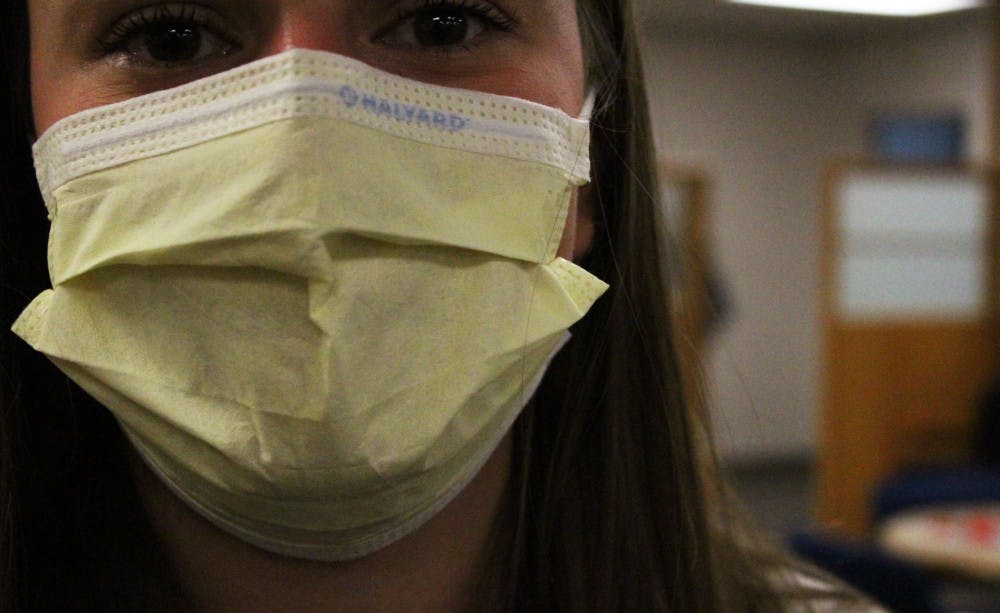College campuses can be breeding grounds for the spread of illness. It’s flu season, and IU is not exempt.
Dr. Diana Ebling, medical director at the IU Health Center, said the uptick in flu cases this month at IU mirrors what’s happening nationally.
“It’s not unusual,” she said. “Typically, flu will peak in January or February, but we can see cases into April sometimes.”
Ebling, who has worked at the IU Health Center for 30 years, said this winter brought what she considers relatively normal flu numbers through the IU Health Center's doors.
Amy Meek, program manager for the Monroe County Public Health Clinic, said the clinic has seen much higher levels of influenza-like illnesses, also known as ILI, this year than last.
Sicknesses are classified ILI when the individual has flu symptoms but has not necessarily been tested for the flu. Not every student displaying symptoms will be swabbed for the flu.
Avoid the flu with common sense
Ebling said the flu can often be prevented by following the same advice many parents give their children.
Don’t share drinks or utensils. Don’t hang out with sick people. Wash your hands.
The IU Health Center, a full-service clinic for students, is also encouraging people to schedule online appointments before coming in so they spend less time inside the center. Ebling said housekeepers on staff also sanitize the facility regularly in an effort to prevent the spread of germs.
Meek said individuals experiencing flu symptoms should call in before going to the clinic, since doctors and nurses don’t want contagious patients in their waiting rooms.
The IU Health Center also provides masks to patients who are coughing to prevent the spread of respiratory infection. Meek said the clinic does the same thing.
Signs of influenza
The flu comes on more quickly than a standard cold. Individuals who wake up feeling fine may be experiencing body aches and fever later in the night, Ebling said.
She said students who have a fever should not go to class and should avoid socializing until their fever has been gone for at least 24 hours.
The idea that the flu always involves vomiting and diarrhea is a myth.
“People will get a stomach bug, and they’ll call it the flu, but that’s not the true influenza,” Meek said.
Ebling said people who aren't experiencing those gastrointestinal symptoms assume they don't have the flu, but that is incorrect.
“Influenza is typically a respiratory illness. It’s a cough, fever, body ache, stuffy nose, a fatigue,” she said.
When to seek help
Ebling said students who are generally healthy and don’t have underlying chronic conditions will likely be able to recover from the flu and other viruses on their own.
She said healthy individuals can often self-treat at home by taking medication like Ibuprofen to lower their fever, but if they have any questions, they should be evaluated by a medical professional.
Individuals with health problems like asthma or heart conditions may want to seek medical attention if they feel ill. Also, any shortness of breath or chest tightness are definitely reasons to visit the health center, Ebling said.
It’s not too late for a flu shot
The Monroe County Public Health Clinic still has flu vaccines available. They hold walk-in hours on Wednesdays from 8:30 to 11:30 a.m., and individuals can call to schedule an appointment at a different time.
Meek said although the shot is not guaranteed to prevent the flu, it's worth getting.
“Not getting your shot is definitely zero percent effective,” she said.
The IU Health Center doesn’t have any flu vaccines left, but Ebling said certain CVS Pharmacies in Bloomington still have some.
She said the vaccine also reduces the severity of the flu when it is contracted and reduces the risk of complications, like pneumonia, from the illness.
A previous version of this story referred to Dr. Diana Ebling as a medical director at IU Health Bloomington. The correct healthcare provider was the IU Health Center, which is unaffiliated with IU Health Bloomington. The IDS regrets this error.




